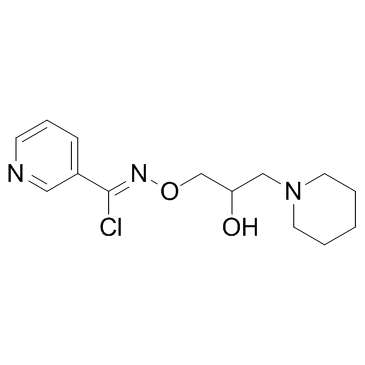| Description |
Bimoclomol is a heat shock protein (HSP) coinducer, used for treatment of cardiovascular diseases.
|
| Related Catalog |
|
| Target |
HSP
|
| In Vitro |
Bimoclomol (40 μM) significantly increases coronary flow (CF) in the period of normoxic perfusion (before ischemia). Bimoclomol significantly increases LVDP and CO, but it decreases LVEDP under ischemic conditions. Bimoclomol displays a biphasic effect on the rate of relaxation. Bimoclomol (>10 μM) causes concentration-dependent vasorelaxation, with EC50 value of 214 μM. Bimoclomol (100 μM) induces vasorelaxation also against 20 mM KCl. However, bimoclomol fails to relax preparations precontracted with serotonin, PGF2 or angiotensin II[1]. Bimoclomol does not affect the stability of Hsp70 or its mRNA. Bimoclomol coinduces Hsp expression via the prolonged activation of the heat shock transcription factor (HSF-1). The effects of bimoclomol are abolished in cells from mice lacking HSF-1. Furthermore, bimoclomol can bind to HSF-1 and induce a prolonged binding of HSF-1 to the respective DNA elements[2]. Bimoclomol (0.1, 1 and 10 μM) improves cell survival of rat neonatal cardiomyocytes compared to vehicle-treated cells. Bimoclomol (0.01 to 10 μM) significantly elevates HSP70 levels, based on the time of exposure. Pretreatment with bimoclomol for 24 h significantly increases survival of cells[3].
|
| In Vivo |
Bimoclomol (1 and 5 mg/kg) decreases the ST-segment elevation induced by coronary occlusion by 56% and 80%, respectively, in anesthetized dogs[1].
|
| Cell Assay |
Using the same cell preparation, a cytoprotection (cell survival) assay is configured to assess the ability of bimoclomol to protect cells exposed to a lethal stress. To optimize the cell survival determinations, final plating densities for this protocol are reduced to approximately 0.5 million cells/mL. Plated cardiomyocytes are placed in an incubator (37°C, 5% CO2) for 24 h. The plates are removed from the incubator and the media changed to serum free. Separate sets of cells are either heat shocked at 42°C for 1 h or treated as sham (no heat shock). Bimoclomol is then added to individual wells at 0, 0.01, 0.1, 1, 10 and 100 μM and the plates are placed back in the 37°C incubator for 24 h. The plates are removed from the incubator and after another media change, (serum free) all plates are exposed to a lethal heat stress for 2 h in a waterbath set at 47°C. The plates are then placed back in the 37°C incubator overnight (16-18 h). The following morning, cell survival is determined using trypan blue exclusion. Equal volumes of culture medium and trypan blue solution are mixed. After removing the spent media from the wells, the above mixture is added to the wells for 10 min. The cells are then washed three times with cold PBS and counted with an inverted light microscope (10×). The final survival values from this protocol are expressed as the percentage of viable cells per treatment using the formula [(stained cells−total cells)÷total cells]×100.
|
| References |
[1]. Jednakovits A, et al. In vivo and in vitro acute cardiovascular effects of bimoclomol. Gen Pharmacol. 2000 May;34(5):363-9. [2]. Hargitai J, et al. Bimoclomol, a heat shock protein co-inducer, acts by the prolonged activation of heat shock factor-1. Biochem Biophys Res Commun. 2003 Aug 1;307(3):689-95. [3]. Polakowski JS, et al. Bimoclomol elevates heat shock protein 70 and cytoprotects rat neonatal cardiomyocytes. Eur J Pharmacol. 2002 Jan 18;435(1):73-7.
|
